US Navy 'Intercepts' Iranian Drone Over The Persian Gulf

The US Navy in the Persian Gulf “intercepted” an Iranian drone “operating in an unsafe and unprofessional” manner, CENTCOM reported on Saturday.

The US Navy in the Persian Gulf “intercepted” an Iranian drone “operating in an unsafe and unprofessional” manner, CENTCOM reported on Saturday.
Announcing the incident on X, the US military did not provide more detail except a photo taken from a US aircraft showing an unmanned aerial aircraft flying above what appeared to be an aircraft carrier. It did not say if the drone had left after it was intercepted, or what that term exactly meant.
Iranian military officials boasted earlier that their drones were closely following the US naval strike group led by the aircraft carrier Dwight D Eisenhower that entered the Persian Gulf earlier in the week. The naval group was first sent to the eastern Mediterranean after war broke out between Israel and Hamas following the October 7 attack on Israel that killed more than 1,000 civilians and the taking of more than 200 hostages by Hamas.
Despite daily statements in support of Hamas, Iran has avoided direct involvement in the war, but its proxy forces in the region have attacked US forces dozens of times since mid-October.
Alireza Tangsiri, commander of the IRGC navy said on Friday that warships belonging to foreign countries were in the Persian Gulf region only to “foment tensions”.
Tangsiri claimed earlier in the week that his forces had sent drones to harass the operations of the USS Dwight D. Eisenhower aircraft carrier and its strike group. The incident was confirmed and described as "unsafe, unprofessional and irresponsible" in a statement issued Wednesday by US Naval Forces Central Command chief Vice Admiral Brad Cooper.
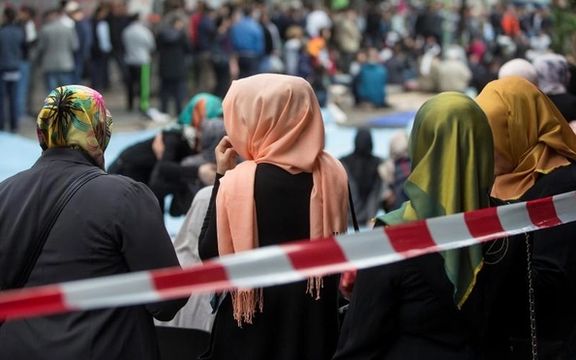
The German human rights commissioner who rebuffed Iranian female dissidents on Thursday, reportedly views the hijab as a form of emancipation for women.
The Iranian dissident, Masih Alinejad, pulled the plug on a meeting with the federal human rights commissioner, Luise Amtsberg, because Amtsberg did not wish to publicize the substance of the discussion.
The German magazine Stern reported in 2017 that the Green party politician had said she learned the head scarf can be a sign of emancipation, adding “We forget that sometimes.”
Amtsberg wrote her master’s thesis on “Feminism in Islam: Using the example of the Palestinian women’s movement.”
Lawdan Bazargan, a California-based Iranian-American political and human rights activist, told Iran International, “The hijab is an ideology, and like any ideological belief, it is linked to 'interests' and 'power.’ The hijab serves a dual function; it privileges veiled women in Islamic societies while also helping to reproduce the system's inherent patriarchy."
Bazargan, who is currently campaigning to secure the dismissal of Oberlin College’s Mohammad Jafar Mahallati, Iran’s former ambassador to the UN, added, “Ultimately, the hijab humiliates and disempowers women in society. It is shameful for a European woman, born and raised in a democratic country with liberal values, to idolize a symbol that oppresses millions of women, acting like a chain around their necks, suffocating them.”
Alinejad has long campaigned against the hijab. The Islamic Republic of Iran imposed the mandatory hijab on women after the 1979 revolution in 1981.
Iran International reported last week that the clerical regime has impounded the cars of people who violate the rules of the mandatory Hijab. In 2022, after dozens of Iranian women unveiled in public and sent their videos to Alinejad in New York, the clerical regime said women can be sentenced up to 10 years in jail for sending Alinjead the footage.
The outrage over Amtsberg’s attempt to silence the Iranian dissidents in Berlin has shined a new spotlight on the Green party’s overly cordial relationship with the Islamic Republic.
Amtsberg’s Green party has a long tradition of holding public meetings with Iranian regime officials and politicians who have denied the Holocaust, defended the use of stoning for adultery, and engaged in killing Iranians.
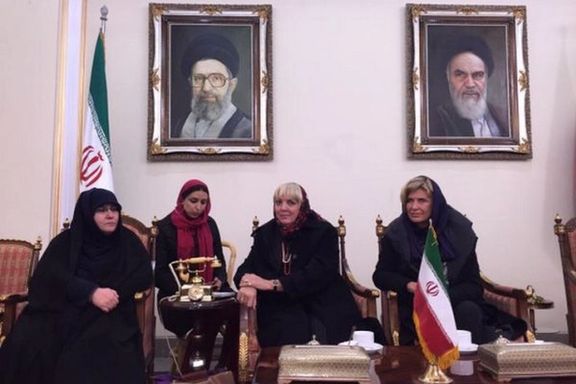
In 2019, Germany’s best-selling newspaper, Bild, published a series of news articles and an editorial titled “Shame on the Bundestag” that exposed the then-Green party Bundestag vice president Claudia Roth’s enthusiastic greeting of the former speaker of the Iran’s ersatz parliament, Ali Larijani.
Larijani defended former Iranian president Mahmoud Ahmadinejad’s denial of the Holocaust at the 2009 Munich Security Conference.
Roth is currently Germany’s cultural minister and, in 2010, met in Tehran with the former speaker's brother, Mohammad-Javad Larijani, who defended the stoning of people who committed adultery. Mohammad-Javad Larijani served as the head of the Iranian Human Rights Council. A year before Roth’s meeting, he denied the Holocaust at a German foreign ministry-sponsored event in Berlin held close to the Holocaust memorial.
Roth courted Manouchehr Mottaki who, while foreign minister, delivered a key speech at Tehran’s 2006 Holocaust denial conference.
The largely pro-Iran politician, Roth, also high-fived then-Iran ambassador to Germany, Reza Sheikh Attar, at the 2013 Munich Security Conference. Iranian Kurdish dissidents accused Attar of carrying out a massacre of Kurds during his tenure as governor of Kurdistan and West Azerbaijan provinces between 1980-1985.
The German foreign minister, Annalena Baerbock, has also faced intense criticism from German opposition politicians and Iranian dissidents for her dovish posture toward Tehran. Baerbock refuses to sanction the IRGC as a terrorist organization. She claims to practice a “feminist foreign policy” but her inaction toward the IRGC—a US-designated terrorist organization dedicated to enforcing the mandatory hijab—has sparked criticism from Alinejad and other Iranian dissidents.
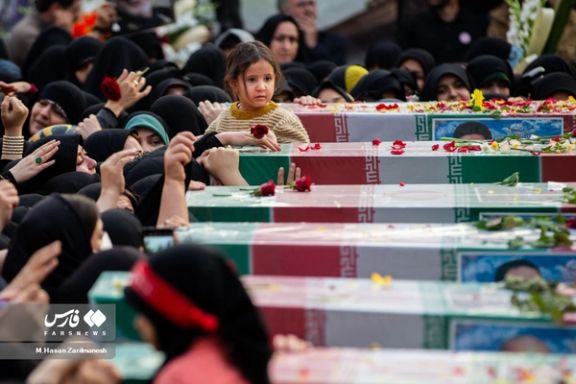
In the latest Israeli airstrike targeting Syria, Brigadier Generals Panah Taghizadeh and Mohammad-Ali Ataei (Shoorcheh) of the Islamic Revolutionary Guard Corps (IRGC) were killed.
The IRGC confirmed their deaths, stating that the generals were on an "advisory" mission in Syria. The Guards' Sepah News website reported, "Mohammed Ali Ataei Shoorcheh and Panah Taghizadeh... were martyred by the Zionist usurper enemy while conducting an advisory mission in the Syrian Islamic resistance front," without providing further details.
Israeli airstrikes hit several areas on the outskirts of Damascus early Saturday, causing "material losses," according to Syrian state media. The strikes targeted the southern Damascus suburb of Sayyida Zeinab, where Hezbollah-affiliated forces operate. The Syrian Observatory for Human Rights reported two Syrian citizens and two foreigners killed, with five others wounded.
Israel has frequently conducted airstrikes in Syria since the civil war began in 2011, focusing on Iran-backed forces, Hezbollah fighters, and Syrian army positions. The recent surge in attacks aligns with the Israel-Hamas conflict that started in October.
The incident is expected to heighten tensions between Israel and Iran, a key supporter of the Palestinian group Hamas. Iran has warned of the conflict's potential spread to other regional areas. Israel remains concerned about Iran's military presence in Syria and is committed to preventing Iranian entrenchment along its northern border.
During the ongoing Israel-Hamas conflict, Israel has targeted Syria, impacting international airports in Damascus and Aleppo for over a month. Iran has played a significant role in supporting Syrian President Bashar al-Assad throughout the 12-year civil war, deploying fighters to tip the balance in Assad's favor. Despite Tehran maintaining a military advisory role, numerous Iranian Revolutionary Guard members have lost their lives in the Syrian conflict.
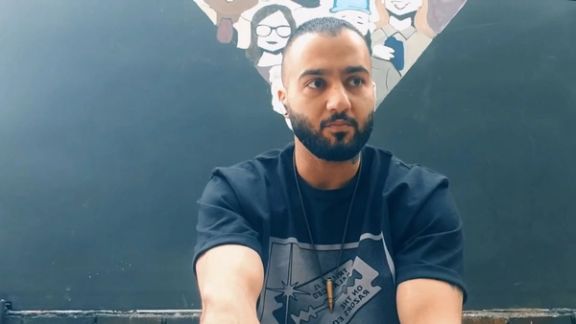
Ye-One Rhie, a German lawmaker and political sponsor of Iranian rapper Toomaj Salehi, has issued an urgent call for his release after his second arrest.
In a conversation with Iran International, Rhie expressed deep concern about Salehi's well-being, emphasizing the lack of information about his whereabouts.
Toomaj Salehi, 33, was apprehended by plainclothes individuals on a street in Babol, northern Iran, on Thursday. He was reportedly subjected to severe physical abuse during the arrest, including beatings with the butts of AK-47 rifles and pistols, as reported on his social media page.
Rhie underscored the Iranian regime's fear of Salehi's message, stating, “The fact that he was taken again shows the Iranian regime is very, very afraid of him and what kind of message he's sending to all those people who are unhappy, who are not satisfied with how the country is going, how Iran is developing.”
Salehi had previously spent over a year in prison, with 252 days in solitary confinement, before being released on bail on November 18th. Following his re-arrest, social media erupted with a trending campaign, garnering over 75,000 mentions of Toomaj Salehi on various platforms.
Rhie concluded by demanding answers from the Iranian authorities, stating, “I am very positive that Salehi is such a man that the Iranian regime will not be able to break him at all and not to break his spirits. I'm demanding answers as I wrote to the ambassador of the Islamic Republic of Iran in Berlin, to tell me where he is.”
Salehi gained prominence for his protest songs addressing social issues and government injustices in Iran. His initial arrest in October 2022 was part of a broader crackdown on political opponents of the regime. Rhie urged the dropping of all accusations, sentences, and the release of Salehi and other political prisoners, emphasizing the injustice of their detention.

The head of Iran’s Inspection Organization has disclosed that a prominent tea importer has come under scrutiny for questionable financial practices.
The company, handling the majority of the country's tea imports, reportedly received a staggering $3.37 billion in foreign currency at discounted government rate for tea and machinery imports from 2019 to 2022. However, it has allegedly sold $1.4 billion of the currency on the free market at a higher rate.
Zabihollah Khodayian highlighted the company's alleged transgressions, emphasizing its violation of premium-grade tea orders. However, he did not disclose the name of the company.
“Despite registering a $14 per kilogram order for premium Darjeeling tea from India, the company purportedly imported significantly cheaper Kenyan tea and bought Iranian grade-two tea at a value of around $2 per kilogram,” added Khodayian.
The government, controlling the economy and foreign currencies allocates cheaper foreign currency to facilitate crucial imports.
The Central Bank of Iran operates the NIMA currency scheme to make imports more affordable and control inflation. The system allows exporters to sell foreign currency at a reduced rate and permits importers to purchase currency at the same lower rate to finance their transactions abroad.
However, the official government rate of around 370,000 rials to the dollar in the NIMA scheme contrasts sharply with the free market rate of about 510,000 rials. This disparity has led to corrupt practices, where well-connected entities exploit the lower rate, obtaining cheap dollars and diverting them for purposes other than intended imports.
The Iranian government, grappling with economic complexities exacerbated by sanctions, regularly intervenes in the currency market to stabilize the beleaguered rial. Despite these efforts, the challenges persist, and instances of currency misuse continue to pose serious concerns.

A hardline politician recently suggested that that an absolute ruler in Iran is not enough, “absolute obedience” is needed, referring to the Supreme Leader.
The statement comes after more questions have risen about how the parliament has become a rubber stamp and hardliners dominating the government get their power from Supreme Leader Ali Khamenei’s office. Consequently, questions also arise as to what the constitutional powers of the Supreme Leader are and do elections and elected offices mean anything, when he can dictate his will.
Hardline cleric Morteza Aqa-Tehrani, the chairman of the central council of ultraconservative Paydari Party recently quoted the party's founding father, Ayatollah Mohammad Taqi Mesbah-Yazdi as having called for the nation's absolute obedience to Supreme Leader Ali Khamenei.
Aqa-Tehrani quoted Mesbah as saying, "The absolute rule of the Supreme Leader is not enough as the theory of government under the Islamic Republic. The system also needs absolute obedience of the people to the supreme leader."
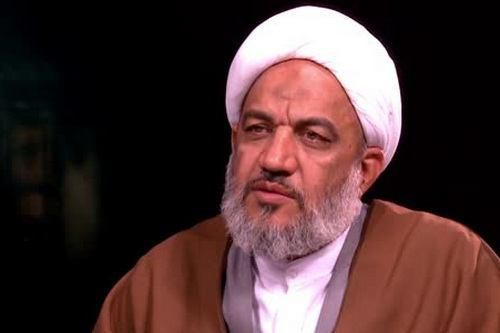
The statement effectively would render the legislative system in Iran meaningless. According to the ultraconservative party, Khamenei can make any decision, and the people will have no choice other than obeying what he decrees. What makes Aqa-Tehrani’s statement more dangerous is that his party is poised to gain absolute majority in the March parliamentary elections that are being heavily engineered to give a monopoly of power to hardliners.
Commentator Abbas Abdi writing in Tehran’s reformist daily Etemad on Saturday argued that those who speak about “absolute obedience” to the Supreme Leader, in fact are doing a disservice to him. A modern state cannot be governed on that basis because the world has changed in the past 200 years and now governing a country needs expertise in different fields, he stated. Those who insist on absolute obedience in fact leave the Supreme Leader in a lonely position, vulnerable to all things that can go wrong and make him a target for blame.
Mr. Khamenei has already entered the unenviable position of being seen as responsible for a once rich and promising developing country that is now on the verge of becoming a failed state. Anti-regime protests in recent years have demonstrated that increasingly many people have turned against Khamenei, seeing him as responsible for a failed state and an impediment to a better life.
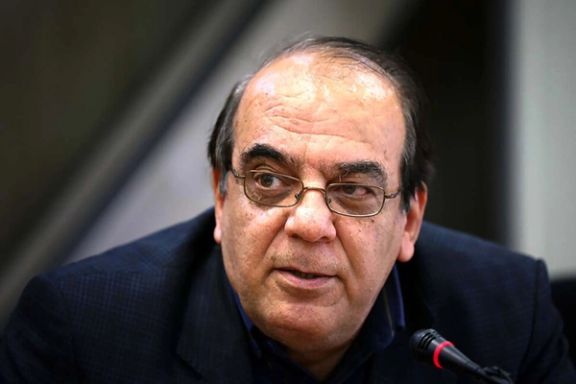
Iran’s economy, straddled with unsurmountable inefficiencies of nepotism and political control, has little hope of resuming development and progress. Sitting on the world’s second largest natural gas resources, Iran faces domestic shortages, let alone an ability to export.
Crude oil exports, limited by US sanctions, are not even enough to help bridge a 50-percent budget gap. The country needs $160 billion to overhaul and modernize its energy sector, according to oil minister Javad Owji, but its annual crude exports barely reach $22 billion. Iran resembles a football player who has lost track of the ball and no matter how fast he runs, it seems too late to catch up.
Iranians see this hopeless situation as the result of Khamenei’s 34-year rule, and his hardline loyalists resort to more praise and demands of full obedience, while many see his days numbered at the old age of 84.
Recently, former President Hassan Rouhani publicly referred to the inevitable, the death of the leader, and hinted at the need to look forward. This week, a senior cleric revealed that a small committee is looking into appointing a deputy leader. But the day after Khamenei’s eventual passing is what many whisper about. Who would replace him. Will there be a nasty power struggle, or even a “collective leadership” to replace the Supreme Leader? What will the Revolutionary Guard do? Will they push their own candidate, or they will start an internal power struggle?
Abdi referring to “absolute obedience” wrote, “I would like to say that those who make this statement are essentially pursuing their own agendas. By seemingly expressing support for the velayat-e faqih (Supreme Leader), they aim to advance their projects. Lacking intellectual courage and self-sufficiency, they seek to promote their plans through this statement.”